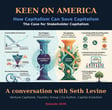
Episode 2241: Gaia Bernstein on the Threat of AI Companions to Children
No, social media might no longer be the greatest danger to our children’s well-being. According to the writer and digital activist Gaia Bernstein, the most existential new new threat are AI companions. Bernstein, who is organizing a symposium today on AI companions as the “new frontier of kid’s screen addiction”, warns that this new technology, while marketed as solutions to loneliness, may actually worsen social isolation by providing artificially perfect relationships that make real-world interactions seem more difficult. Bernstein raises concerns about data collection, privacy, and the anthropomorphization of AI that makes children particularly vulnerable. She advocates for regulation, especially protecting children, and notes that while major tech companies like Google and Facebook are cautious about directly entering this space, smaller companies are aggressively developing AI companions designed to hook our kids.
Here are the 5 KEEN ON takeaways in our conversation with Bernstein:
* AI companions represent a concerning evolution of screen addiction, where children may form deep emotional attachments to AI that perfectly adapts to their needs, potentially making real-world relationships seem too difficult and messy in comparison.
* The business model for AI companions follows the problematic pattern of surveillance capitalism - companies collect intimate personal data while keeping users engaged for as long as possible. The data collected by AI companions is even more personal and detailed than social media.
* Current regulations are insufficient - while COPPA requires parental consent for children under 13, there's no effective age verification on the internet. Bernstein notes it's currently "the Wild West," with companies like Character AI and Replica actively targeting young users.
* Children are especially vulnerable to AI companions because their prefrontal cortex is less developed, making them more susceptible to emotional manipulation and anthropomorphization. They're more likely to believe the AI is "real" and form unhealthy attachments.
* While major tech companies like Google seem hesitant to directly enter the AI companion space due to known risks, the barrier to entry is lower than social media since these apps don't require a critical mass of users. This means many smaller companies can create potentially harmful AI companions targeting children.
The Dangers of AI Companions for Kids
The Full Conversation with Gaia Bernstein
Andrew Keen: Hello, everybody. It's Tuesday, February 18th, 2025, and we have a very interesting symposium taking place later this morning at Seton Hall Law School—a virtual symposium on AI companions run by my guest, Gaia Bernstein. Many of you know her as the author of "Unwired: Gaining Control over Addictive Technologies." This symposium focuses on the impact of AI companions on children. Gaia is joining us from New York City. Gaia, good to see you again.
Gaia Bernstein: Good to see you too. Thank you for having me.
Andrew Keen: Would it be fair to say you're applying many of the ideas you developed in "Unwired" to the AI area? When you were on the show a couple of years ago, AI was still theory and promise. These days, it's the thing in itself. Is that a fair description of your virtual symposium on AI companions—warning parents about the dangers of AI when it comes to their children?
Gaia Bernstein: Yes, everything is very much related. We went through a decade where kids spent all their time on screens in schools and at home. Now we have AI companies saying they have a sol
















